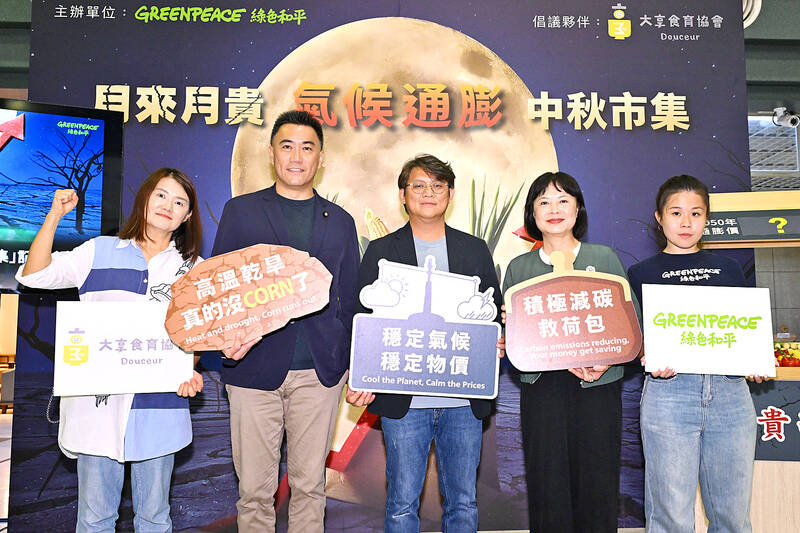Greenpeace yesterday urged the Cabinet’s National Climate Change Committee to discuss strategies for addressing “climate inflation.”
Greenpeace East Asia climate and energy campaigner Lydia Fang (方君維) told a news conference in Taipei that climate change seriously affects the world economy, while “climate inflation” impacts are increasing yearly.
Greenpeace’s survey showed that the cost of food ingredients sold during the Mid-Autumn Festival has increased by nearly 40 percent in the past decade, Fang said.

Photo: Chen Yi-kuan, Taipei Times
The government should acknowledge that solving climate change can slow down inflation, she said, urging President William Lai’s (賴清德) National Climate Change Committee to make “climate inflation” a priority agenda in developing climate strategies.
Short-term strategies should include “climate change compensation” to help people cope with economic losses and damage from natural disasters caused by climate change, which would help reduce the effects on more vulnerable groups, such as children, older people and low-income households, Fang said.
The mid to long-term strategies should include a “net zero investment bill” to fund the purchase of renewable energy power generation equipment by individuals or companies, she said.
The UN Committee on the Rights of the Child’s General Comment No. 26, passed last year, has a special focus on climate change, recognizing that children have a right to a clean, healthy and sustainable environment, Democratic Progressive Party Legislator Lin Yue-chin (林月琴) told the news conference.
The document also states that governments must take all necessary, appropriate and reasonable measures to protect against climate change-related harms to children’s rights that are caused or perpetuated by businesses, and to ensure that corporations rapidly reduce their emissions, she said.
Lin said she would ask the Ministry of Economic Affairs and the Directorate-General of Budget, Accounting and Statistics to consider those issues when formulating policies, so that the next generation does not face unlivable conditions and a rapidly growing gap between the rich and the poor due to climate change.
Chinese Nationalist Party (KMT) Legislator Huang Chien-pin (黃建賓) said that climate change has had a serious effect on agriculture in Taitung County, limiting output and the stability of prices.
“We indeed need to think carefully about what kind of environment we want to leave for our next generations,” he said.
KMT Legislator Jonathan Lin (林沛祥) said that a phrase he heard during an international conference he attended last year had stuck with him: “Climate change and global warming would not destroy the world, but would cause human extinction.”
Climate change not only causes rising sea levels, but also practical food issues, he said, adding that usually crabs can be harvested in Keelung or along the northern coast around the Mid-Autumn Festival, but now they can only be found after October, and the harvest amount and quality have fallen.
“Net zero emissions is the only path forward, and going against nature would only harm humans,” he said.

Nipah virus infection is to be officially listed as a category 5 notifiable infectious disease in Taiwan in March, while clinical treatment guidelines are being formulated, the Centers for Disease Control (CDC) said yesterday. With Nipah infections being reported in other countries and considering its relatively high fatality rate, the centers on Jan. 16 announced that it would be listed as a notifiable infectious disease to bolster the nation’s systematic early warning system and increase public awareness, the CDC said. Bangladesh reported four fatal cases last year in separate districts, with three linked to raw date palm sap consumption, CDC Epidemic Intelligence

The manufacture of the remaining 28 M1A2T Abrams tanks Taiwan purchased from the US has recently been completed, and they are expected to be delivered within the next one to two months, a source said yesterday. The Ministry of National Defense is arranging cargo ships to transport the tanks to Taiwan as soon as possible, said the source, who is familiar with the matter. The estimated arrival time ranges from late this month to early next month, the source said. The 28 Abrams tanks make up the third and final batch of a total of 108 tanks, valued at about NT$40.5 billion

Two Taiwanese prosecutors were questioned by Chinese security personnel at their hotel during a trip to China’s Henan Province this month, the Mainland Affairs Council (MAC) said yesterday. The officers had personal information on the prosecutors, including “when they were assigned to their posts, their work locations and job titles,” MAC Deputy Minister and spokesman Liang Wen-chieh (梁文傑) said. On top of asking about their agencies and positions, the officers also questioned the prosecutors about the Cross-Strait Joint Crime-Fighting and Judicial Mutual Assistance Agreement, a pact that serves as the framework for Taiwan-China cooperation on combating crime and providing judicial assistance, Liang

A group from the Taiwanese Designers in Australia association yesterday represented Taiwan at the Midsumma Pride March in Melbourne. The march, held in the St. Kilda suburb, is the city’s largest LGBTQIA+ parade and the flagship event of the annual Midsumma Festival. It attracted more than 45,000 spectators who supported the 400 groups and 10,000 marchers that participated this year, the association said. Taiwanese Designers said they organized a team to march for Taiwan this year, joining politicians, government agencies, professionals and community organizations in showing support for LGBTQIA+ people and diverse communities. As the first country in Asia to legalize same-sex